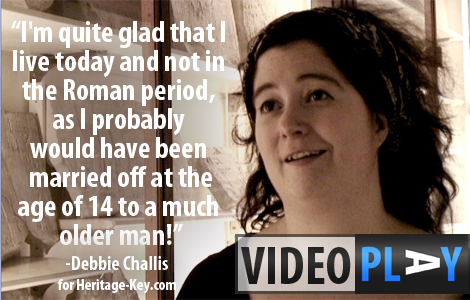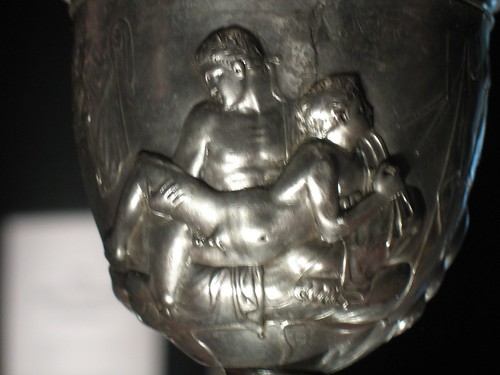 It’s the month of love, as our wealth of Valentine’s-inspired articles and contests testify (including dinner at Stonehenge Virtual and the top ten ancient romances), so from the murky history of theLondon Stone, we’ve delved into the mucky world of love and sex in the ancient world. A quick glance on the net will show you February has been linked with love since the Classical Period: Lupercalia, celebrated from the 13th to 15th, hailed fertility – while Gamelion worshipped the marriage of Zeus and Hera.
It’s the month of love, as our wealth of Valentine’s-inspired articles and contests testify (including dinner at Stonehenge Virtual and the top ten ancient romances), so from the murky history of theLondon Stone, we’ve delved into the mucky world of love and sex in the ancient world. A quick glance on the net will show you February has been linked with love since the Classical Period: Lupercalia, celebrated from the 13th to 15th, hailed fertility – while Gamelion worshipped the marriage of Zeus and Hera.
But there’s a seedier side to Greco-Roman relations. And if you’ve ever seen the erotic frescoes at Pompeii, you’ll understand why we were quick to whisk Natalie off to Bath Spa, an hour from London, to see what really went on at Aquae Sulis (‘The Waters of Sulis’) for our latest Ancient World in Londonvideo.
But while most scenes at Pompeii would make a Vivid director blush, it seems goings-on at Bath were more Mary Whitehouse than Debbie does Dallas. “There’s a bath at Rome that has erotic wall paintings,” says Roman Baths manager Stephen Clews, “so it’s assumed the activities there were morally questionable. But I think this bath-house probably wouldn’t have been like that, it’s whole set-up was rather different…probably under the control of priests.”
Lack of licentiousness aside Bath is a beautiful place, one of England’s biggest tourist attractions, and with good reason. Though everything above waist height is a Georgian construct, it’s still a unique insight, in Britain at least, into a religious Roman holiday camp (think Butlins with a little less drinking). A hot spring brings water gushing to the surface at up to 46 degress – no wonder, then, that locals from Druidic times until the Middle Ages held Bath up as a gift from the gods.
“When the Romans first arrived in this part of the world there was no reason for them to settle here, apart from the fact that there was hot water coming out of the ground,” says Charlotte Hanna, marketing manager for Thermae Bath Spa, a modern spa built just around the corner from the Roman baths. “Once the Romans withdrew from Britain, the city carried on thriving as a small market town but with hot water…without the water there really wouldn’t be a city.”
 It seems that while Romans were getting down and dirty across the channel, their Britannic counterparts were getting little more than a good scrub. A little disappointing, if I’m honest. So we chatted to Debbie Challis of the Petrie Museum, to see just how different things were 2,000 years ago. “Romance is an alien concept to the ancient world, particularly the Romans. Love affairs…depends on your position in society.”
It seems that while Romans were getting down and dirty across the channel, their Britannic counterparts were getting little more than a good scrub. A little disappointing, if I’m honest. So we chatted to Debbie Challis of the Petrie Museum, to see just how different things were 2,000 years ago. “Romance is an alien concept to the ancient world, particularly the Romans. Love affairs…depends on your position in society.”
There’s little wonder, says Debbie, that all the great Roman love poets were men: “If you were a Roman man you could afford to have love affairs and write poetry. For a Roman woman it would be very different. It would be different again if you were a slave woman.” Some might say the Romans were an enlightened bunch, but it seems they would have hardly made Germaine Greer a best-seller.
The Greek world may have taught us democracy and geometry, but one side of their culture seems certain not to catch on in a hurry. The idea of pederasty – whereby an older man, an erastes, would court a younger man (as young as 14), the eromenos, hoping to have sex with him – still steers pretty close to today’s mark.
“The reason it’s alien to us today,” says Debbie, “is because our idea of when people should have sex has changed. In the last ten, twenty years we find the idea of sex between men less weird, but we find the idea of such older men and younger men more problematic.” The practice is captured in the controverial Warren Cup, a stunning silver goblet featuring two explicit homoerotic scenes. Withheld from public view until 1980, the Cup is now one of the British Museum’s best examples of Greco-Roman artwork.
HD Video: Love and Sex in the Ancient World
(Click here to read a transcript of this video)
You can participate in Ancient World in London through our contests – if you’re in London, then check out Spot Ancient London, otherwise you can join in the fun with our virtual quest or the blogger’s challenge. Take a look through our soon – with your help – to be complete directory of The Ancient World in London and suggest any that we may have missed. Just as well, do not hesitate to contact us if you have any suggestions for our webseries! Keep up-to-date with everything in the Ancient World in London by subscribing to our RSS feeds, or by following us onTwitter,YouTube,Facebook,FlickrandiTunes.Heritage Key – Unlock the Wonders.